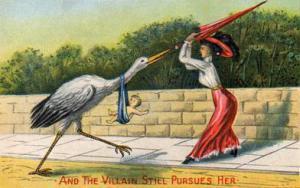Kelly Barnhill's Blog, page 8
December 13, 2013
A quick update on my 1,000-year-old…. actually 1,001-year old dog.
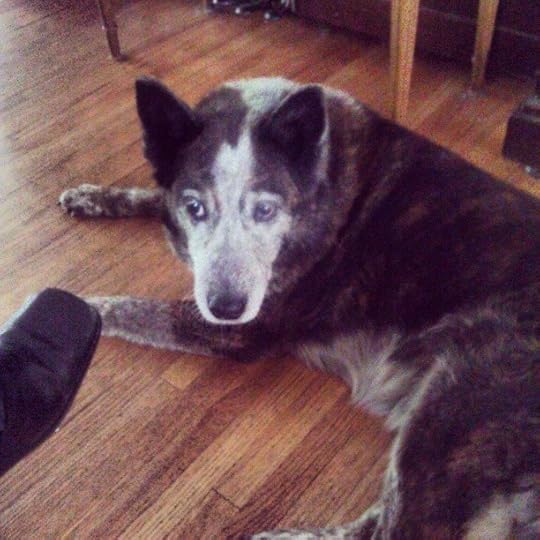
The internet is a funny place. I wrote this piece about my ancient, beloved, sometimes foul-tempered, and often stinky, but always utterly herself, cattle-dog-mix – gosh, almost a year ago – and suddenly it has gotten approximately one skillion views over the last two days. Randomly. And people are commenting like mad and sending me beautiful, passionate, and soulful emails, telling me the story of their own beloved pets – those still hanging on, and those tenderly carried into their next grand adventure in that dog park in the sky.
And people are asking: how is Harper? Is she still alive?
And it’s a good question. On my block there are a lot of kids and a LOT of dogs. And this year, two very beloved animals left us, and we are all incredibly sad about it. (One of them, Gebo, just passed a couple weeks ago. My little son is heartbroken. Here is his tender tribute. Be careful clicking. You will smile through your flowing tears.)
As for Harper – she’s great! At the very youngest, she is 18 now, but she is likely over 20. That is friggin’ old. But she is tough. And she’s hanging on. Still kicking, still stinking up the place. Still barking her head off at doggie passers-by (my sweet Alpha female, though enfeebled, is still a dang Alpha – and she makes sure the world knows it). She is slowing down, for sure. She snuggles up at my feet while I write. She still gives the stink-eye to the gaggles of boys who tear up and down our stairs and pretend to be slain by lasers and fart on purpose and for no reason. (She is not alone in her stinky-eye, I have to admit.) And while she can’t go as far as she used to, she still enjoys a hike in the forest, and still enjoys her yard, and still eats her food (and the occasional peanut butter sandwich crust, should the Universe provide) and still seems perfectly happy to be here.
There is a truism among parents that one of the benefits of pet-ownership is that it helps to teach kids about death. I think this is true, but it is not the most important lesson that our dogs (and other furry family members) teach us. They teach us about compassion, too. They teach us to be patient. They teach us that life isn’t just short, it’s also fragile. They teach us that it’s important to be a noticer. To put into words what we see in others. Leo is incredibly aware of Harper’s good days and bad days. Sometimes Harper moves more slowly than others. Sometimes she shakes. Sometimes she is in pain. On those days, Leo slows his feet. He asks me when the last time she had her pain meds. He sits down on the floor and rests his arm on her back. Sometimes, he reads her a story.
Having an aging animal teaches us to hang on to each day.
Having an aging animal teaches us to find moments of grace in very small things.
Having an aging animal teaches us to take our responsibility as pet owners incredibly seriously. They look at us, these animals. They see us to our centers. They demand that we do the same.
Look at me, Harper’s eyes say. I’m counting on you.
I know, honey, my eyes say back. I’m here. I’ll be here with every wobbly step. I’ll be here with every good day and bad. I’ll be here with every rattly breath and every contented sigh. I’ll be here when you’re sick. I’ll be here when you’re well. And I’ll be here at the very end.
I promise.
When kids love pets, they learn how to promise. They learn how to care. They learn how to notice. They learn how to empathize. They learn how to nurture. They learn how to tend. They learn how to love. They learn how to say good-bye. These are good things to learn.
Haper is still alive. For now. As we all are. We will hang on to each day until we can’t. It is a blessed thing, really. And I am grateful.
Thank you to everyone who wrote in and told me your stories. I really appreciate them. I honor them. Thank you for sharing your great love with me. Honestly, it means the world.
Much love,
KB
Filed under: Uncategorized Tagged: aging, Australian cattle dogs, parenting, Pets


When books are touchstones. When they are armor and shield. When they are lantern and map. When they are loved to bits, and read to smithereens.
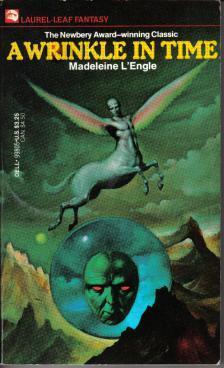
I was twelve years old when I first read A Wrinkle in Time. It was the first time I had read a book where I didn’t just identify with the main character – I was in utter sympatico with her. Everything that Meg Murry felt, I felt. Her loneliness. Her frustration. Her poor social skills. Her emotional immaturity. Her awkwardness. Her separateness from her peers. Her love for her family. Her anger. Her confusion. Her sorrow. The things she said, I could have said. The weird things she did, I could have done (and likely had done). I had never before seen my own struggles in black and white – in the surety of paper and ink. The fact of that book in my hands thrilled me to the core.
I didn’t like the cover, so I tore it off. It was a library book, but I had no intention of returning it. I slid it in between the mattress and box spring of my bed, and read it and re-read it a thousand times. I wonder where it is now. Some nights, I wake up and I am sure I am gnawing on book binding glue. The paper disintegrated long ago – and I am sure I have breathed cloud after cloud of story dust as I sat in the loneliness of that room. The ink seeped into my skin. Those words are written on my bones.
I think I still owe that fine. Don’t tell the library.
I bring it up because, according to the good folks at MPR, it is a Young Adult novel. Except that it’s not YA at all. It’s a Middle Grade novel – and a damn good one. There is a difference, of course, between Young Adult and Middle Grade. I wrote about it, of course, here, and here. It’s been written about on approximately nine million other sites, most notably here and here and here. As expected, the good folks at MPR didn’t care to trouble themselves to learn the difference, and, as expected, it was a Middle Grade novel that won the “Best YA Book of All Time” poll on Minnesota Public Radio, and, as expected, a bunch of children’s authors seethed and ground their teeth that the good ladies of the Daily Circuit couldn’t be bothered to get their terms right – and what’s worse, were incredibly dismissive of those who tried to educate them on what the terms mean and why they matter.
Pete Hautman sums up the situation nicely here and here. Now you can click on the MPR link above, and read through the comments that a bunch of published authors, seasoned librarians, booksellers, and scholars of children’s literature left (myself included) about why it’s so important to get these terms right – if, for no other reason, we can stop all the hand-wringing from parents who don’t understand that if you hand your eight-year-old YA books that explicitly wrestle with the teen experience, said child will be wading through material and life-experiences that are inappropriate to their own experience. A Middle Grade book is a FAR more appropriate choice for that child. The distinctions matter not just for discussion and evaluation, but for purchasing too.
And it’s frustrating to those of us who actually care about books. Who love books. And who are passionate advocates for the role the beloved book in the life of a child.
And THAT’s what I actually wanted to talk about. Beloved books. Important books. The books that matter.
One of the things that I love about my colleagues in Children’s Literature (the writers, the librarians, the teachers, the scholars) is that – to a one – they are all book evangelists in their souls. Each one came to children’s literature because of a central truth that governs their lives. That books matter. That children’s books matter. And that every child deserves the chance to be moved by a book. To be guided by a book. To have a book change their world-view, change their thinking, change their trajectory, change their life.
And, of course, it’s not the book that does this, in the end. It’s the child holding the book who builds the world. And that’s exciting to me.
This time of year, the book world becomes awash with lists. Best-of lists. Newbery contender lists. Folks in the media love the horse-race narrative. They love stories of who’s up and who’s down. They love shadowy contenders. They love statistics. But the problem is that it goes counter to what we all know about books. We do not read for best, and we do not read to give awards, and we do not read to quantify the experience. Our experience with books is a relationship. It grows with us, changes as we change. It is responsive to our evolving understanding, our deepening experience, our complicated lives.
This is because, in the end, a book is a living thing. It insinuates itself into the mind and the heart. It replicates itself in dream and imagination and play. It loves. It worries. It wonders. I have been living with books for a long time, and I understand and believe and will repeat every day until the day I die the one thing that I absolutely know to be true: Books have souls. And so do we.
There have been books, like A Wrinkle in Time, that have taken residence in my life. That have integrated themselves into the landscape of my imagination and written themselves onto my heart. The inform my life as a writer, as a daughter, as a mom and as a wife. They inform my life as a politically aware person, as a good neighbor, as an educator. They protect me when I am sad. They spur me on to fight the good fight. They whisper the truth of my love to the sky. And they stay with me for months, years, decades. My whole life.
For example:

I have no idea how old I was when I read The Silver Chair. My mother had read the entire series to us when we were little, and because I was an averse reader, and frankly a poor reader, the Narnia books were ones that I could pick up and pretend to read with a good amount of authority since I already knew what happened. The truth, man. It’s rough.
But The Silver Chair. It is my favorite of all of them. It is when we learn that Narnia, despite the defeat of the Telmarines, still has its dark places. It’s scary places. There are man-eating giants and soul-sucking swamps and a terrible witch and a scary underworld. But most of all, the two main characters escape to Narnia after fleeing a pack of bullies. This one moment was a talisman for me. That I too might escape. That there might be something beyond the days of soul-crushing humiliation that was my experience in grade school.
That book, in its soul, was me. And it gave me so much hope.
And:

I think I read that book a thousand times. And then I read it to my kids. And then I read it to myself again. What I loved most about it – apart from the adventure and friendship and humor and thrills and whatever – was the fact that the rabbits, in their souls, were storytellers. That their stories had meaning and message. That their stories guided them and fed them and kept them together. That notion plucked at my own inner harmonics – because I was moved by story too. And I self-referred to stories all the time. And I knew that a story could make sense out of senseless situation, and could offer hope and meaning when it seemed that both were lost forever. I knew that a story could light the dark paths, and lead us home.
Also: Fiver. Because come on.
And:
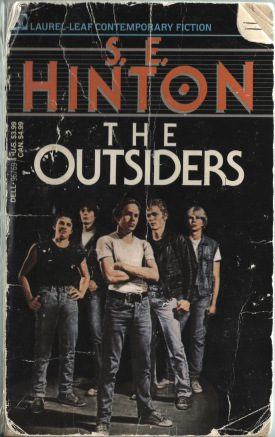
The Outsiders was really my first experience with any kind of transgressive fiction. I had never read a book where kids drank alcohol or said bad words or smoked or fought or whatever. I read it in eighth grade. We had to read Rumble Fish for school – another book that I loved, but I didn’t understand Rumble Fish in its subtlety until much much later. The Outsiders, however, punched me in my guts. It was the first time that I felt exasperated and tender towards characters in my reading. It was the first time that I saw their transgressions as necessary. It was the first time that I really got it that the world can be violent sometimes. And cruel. And unfair. And yet. How the world still has beauty, and friendship, and desperate love. And that poetry matters – as does art. And that we all have the power – even as we take our last breath – to transform.
I am going to do more writing on this subject. On the books that matter, the books we carry, the books that remain in the satchels of our souls - tools, maps, weapons, comfort, inspiration, joy. Whatever.
In the meantime, what are your talisman books, your guiding books, your treasured books. What books do you carry in your heart? What books are written on your bones?
Filed under: Uncategorized Tagged: Childrens literature, Minnesota Public Radio, Pete Hautman, reading, The Chronicles of Narnia, Wrinkle in Time


December 10, 2013
On Feminism, Anti-Feminism, and the Things That Mystify Me
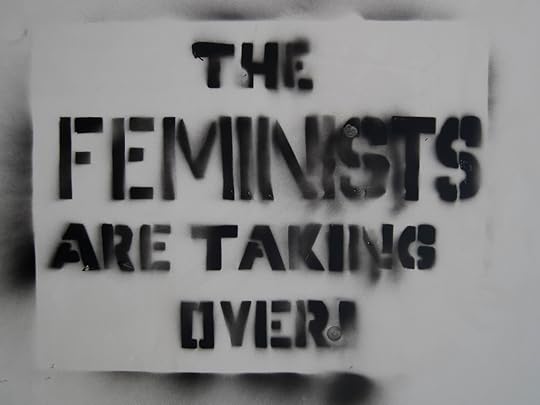
I am ten years old. I am riding a banana seat bike through the alleys. I am allowed to go as far as 31st Street, and then I have to turn back. Words cannot describe how much I love this bike. It is turquoise with sparkly flower decals and I ride back and forth through blocks of alleys singing the entire “Mary Poppins” soundtrack at the top of my lungs. My knees are scratched. My hair needs a comb. I probably haven’t brushed my teeth.
A man in a car pulls up. He opens the window. He asks my name. I have been well-trained. I have learned about good touches and bad touches in school. I know that good people don’t drive up to children on bikes. My teachers have been very clear. I take a good look at his face. I notice his red hair. I take off as fast as I can in the opposite direction, toward home.
He circles around. Meets me mid-way in the next block. Asks me what my hurry is. Tells me I might hurt myself. I do not make eye contact. I power through the next block. I see him again. I keep going.
I am in my driveway, at the edge. My bike is on the ground. I am blocking the way. I am breathing hard. I do not want him to know where I live. But I want to see if it was real – if he was real. I want to understand what is happening. I want to know if he will come snaking down the alley. If he is looking for me.
He does. He slows down. He grins at me. I realize that he is not wearing pants. I don’t see any – you know. Bits. Or, I’m pretty sure I don’t. What I do see is a thatch of red hair where his pants should be. I am horrified. I feel sick. And sweaty. I dry-heave. He laughs and speeds away. I leave my bike where it is. I go inside. I wash my hands. I wash my face. I will never be clean. I do not tell my parents.
Later, I get in trouble later for leaving my bike on the driveway.
It is the first time I am ever afraid of a man. It is the first time that it ever occurs to me to be afraid. It will not be the last.
Every day, someone comes to my blog after googling “anti-feminist movies”. Every. Dang. Day.
(To be fair, people show up at my blog after googling a lot of things. “Taxidermy porn”, for example. And “how to turn my teacher into a toad”. And the ever-popular “mom butt”. The internets, man. It’s a mad country filled with mad people, and we are the maddest of all.)
Now, a while ago (quite a while, actually) I wrote a post about a children’s movie with some pretty gross lady-hating themes, and I’ve managed to catch heck for it. In the comments, in my email box. Whatever. There are people who are seriously mad at me for pointing out that the movie was, in addition to being a crappily-animated, source-text-destroying, dreckish disaster of a movie – it was also grossly antifeminist. Moreover, it fed into the baseless fears of the men’s-rights folks who seem to think that personal empowerment is a zero-sum game. That to empower women means to disempower men. And that the purpose of feminism is to throw men, collectively mind you, into the proverbial dust-bin of history.
These things make me tired.
And sad.
The most troubling statements, though, are the ones that suggest that I, as a children’s author, have no right to call myself a feminist. Or an anything-ist. I had similar hate-letters when I posted a piece railing against Michelle Bachman, or when I wrote in praise of my GLBT married friends.
But feminism, man. There is a special kind of venom for the feminism.
I am fifteen. I take the Lake Street bus every day after track practice. It takes an hour. I settle in, hoping that my prodigious post-running stinkiness will prevent anyone from sitting next to me.
I am wrong. A man in a suit boards the bus. He takes the empty seat next to me. I look out the window. He asks me my name. I pretend to be asleep. He asks me what grade I’m in. I say I have homework even though I don’t. He wants to know why I’m not friendly. He tells me that if I’m not friendly, no one will like me. His hand is on my knee. I leave it there. If I say something, people will look at me. And I don’t want them looking at me. I want to disappear.
The curious thing for me, though, is the sense of ownership. I write children’s books. I tweet. I keep this blog. I have a readership – a small one, sure. But a readership nonetheless. I get notes from readers – both men and women – saying “I come here to read about the writing process” or “I come here to get your insights on….” whatever. Books. Kids. Pretty things. “Please keep your feminism to yourself,” people say in comments I delete. “No one cares about your politics,” one woman wrote me. She wrote a lot of other sentences, mind, and I’ll repeat none of them here. She closed with, “the next time you want to air your grievances, just keep your yap shut.”
Apparently, for both children and children’s authors, silence is golden.
Or maybe it’s not authors. Maybe it’s women. Maybe women saying things online makes us itchy. Or maybe women saying things at all.

I am nineteen. I am on a date. He is much older than I am. Recently divorced. I am nursing a broken heart. He orders me a glass of wine. He’s already had several. I could smell it on his breath in the car. My heart is broken. I do not care. I don’t drink and I’m too young, but he winks at the waitress and says that both glasses are for him. I tell him about my classes. How General Chemistry is kicking my butt. I tell him about my seminar course on Medieval theologians and mystic poets. I tell him that I want to go to medical school.
“Sweetheart,” he says, “you are the sexiest girl to sit at my table in a long, long time. But you just don’t seem smart enough for medical school.” This devastates me. It is the thing I already fear. The thing that keeps me up at night. I want to cry. I want to yell. Instead, I am silent. And my silence is sharp, and hot, and heavy. It has mass and gravity and presence. I get up and leave. He calls me bad words – loudly. Slurring. People don’t stare at him. They stare at me. Their eyes narrow. Because I’m the bitch who’s walking out. I exit the door. It’s winter. It’s crazy cold. I walk back to my dorm. It is five miles. I do not have gloves. I am wearing stupid shoes. And thin tights.
It takes me a week to warm up.
The thing is though? My identity as a feminist informs every facet of my life. It informs my parenting. It informs my reading. It informs the way I listen to the news. It informs my interactions with others. It informs my understanding. It informs the questions that I ask. And it informs the writing that I do - the novels for children, the short stories for grown ups, the stuff on this blog. I can’t take the feminism out. I don’t even know how.
And maybe this is the limitations of my world-view. Because I honestly can’t understand how we can be in this world and not be feminist. How can we just not notice inequality and injustice when it is staring us in the dang face? How can we not come up against the blindness of privilege and not want to change? How can we not desire to open our eyes? All social justice movements, in the end, work to remove shadows and blocks. We cannot see injustice if the limits of privilege block the view. If we remove the block we can see unfairness and we can change the world and make it better. Those blocks are removed through experience, through awareness-raising, and, probably most effectively, through story. Story matters.
I am thirty-four. I am at a Science Fiction convention. I am working on a book. I have finished another one. I am submitting short stories. I am hopeful about my future. The panel discussion is interesting and intense. I raise my hand. I contribute. I am seen. An editor – a prominent guy – comes and chats with me afterward. I have met him before – another conference. I have met his wife. He asks me to join him at the Con Suite to continue chatting. I’m a chatty gal. I’m always up for a good conversation. We continue discussing whatever it is we’re talking about as we go up the elevator. I don’t know where the Con Suite actually is. “Don’t worry,” he says sunnily. “I’ll get us there.” He is standing very close. I don’t think too much of it. He is much older than me. I assume he is hard of hearing. We continue chatting. He opens a door. I follow in. It’s not the Con Suite. It’s his hotel room. And his shirt is off. “Where shall we start?” he says.
I am a feminist. Proudly so. Unabashedly so. It concerns me that I get unpleasant emails and comments just based on this blog. I have in the past. I will in the future. Ugly people will say ugly things, and that is just that. It concerns me that “Writing While Feminist” is offensive to people – that the fact of my world-view and the fact of my voice and the fact that I tell stories and think things and see the world in terms of changing and re-shaping and bettering things for everyone is somehow worthy of vitriol or anger or shaming words.
My books, because they were written by my hands and dreamed up in my brain, cannot be separated from my world-view. The world I live in is much better and more equal than the world in which my grandmothers came of age. But that ain’t saying much. We still put a premium on the male voice in this culture – in publishing, in media, in education, in the law, in medicine. Everywhere. We still discount the female voice. We still discount the female experience. We still discount women’s work. I wish it wasn’t so.
I am at the park. I am wearing a tee-shirt that says “Radical Feminist”. I am with my three kids and my dog. My son is in a sling, his face pressed against my breast, fast asleep.
“Is that shirt a joke?” a woman asks me.
“No,” I say.
“Are you divorced?” she says.
“No,” I say.
“Does your husband know you’re wearing it?”
“My husband bought it for me.”
“Hmph. I would be offended if my husband bought me something like that. It’s like saying ‘I think you’re ugly.’ No offense.”
My books have strong women in them. And unpleasant women. And broken women. My books have strong men in them. And unpleasant men. And broken men. Because all of us are strong, and unpleasant, and broken. Sometimes we are all of these things at once.
I am a feminist because I love men, and I believe that they are capable and strong and wise. I am a feminist because I love women, and I believe that they too are capable and strong and wise. And I am a feminist because I fiercely love my kids. And your kids. And the kids that aren’t born yet. And I think the world that we are giving them can be so much better, so much kinder, and so much more just than the one we got right now.
I am on the bus. I am sitting next to a man who is reading the newspaper. He snorts. He grunts. He shakes his head.
“The feminists are taking over,” he says.
“Yup,” I say, nodding emphatically. “Thank god.”
Filed under: Uncategorized Tagged: Childrens literature, feminism, Gender, Men, Women


December 7, 2013
The Magnificence of Middle Grade – why I read these books, why I write these books, and why these kids are awesome.
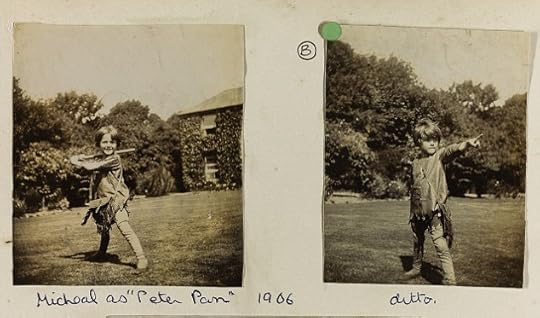
There are three boys under the bridge that spans the small creek at the end of my dead-end street. It is summer. They are all eight years old. It is a glorious age, eight.
“Our parents don’t know we’re here,” says one boy, not knowing that I am standing on the bridge, directly over his head.
“I know,” says another boy. “We’re on our own. Let’s never go back.”
Well, it’s happened again. A bunch of people who don’t read children’s literature with any frequency, passion or enthusiasm asked a bunch of other people who don’t think about children’s literature above the occasional passing interest, to name their “top YA novel”. These conversations always make me crabby. Because – and I must confess this bugs the spit out of me – once again we must wade through well-meaning comments demonstrating the rampant and weird conflation of YA and Middle Grade books.
There is a thing I must make clear: Middle Grade novels and Young Adult novels are not the same novels. To conflate the two is to dampen or derail the discussion. And really, what’s the point of a derailed discussion?
Listen, folks. Caddie Woodlawn is not YA. It’s Middle Grade. From the Mixed-Up Files of Mrs. Basil E. Frankweiler is not YA. It’s Middle Grade. The Giver? Also Middle Grade. And Harry Potter (at least the first four books are MG – number five is squarely in YA territory). A Wrinkle in Time? Yup. That’s Middle Grade too.
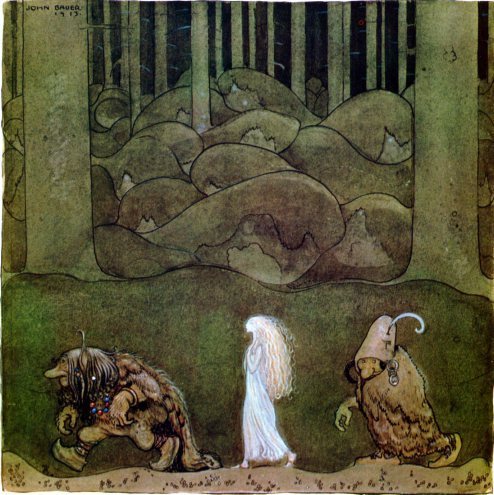
This distinction is important because middle grade kids and teenagers are different. Their world views are different. The rules governing their lives are different. Their relationships are different. And while it is incredibly common for middle grade kids to “read up” and for teenage kids to “read down” (I know TONS of fourth graders who are huge fans of the Hunger Games trilogy, and I know TONS of teens who are huge fans of Terry Pratchett‘s The Wee Free Men, and its tie-in novels), just as it is common for lots of kids – both middle grade kids and teens – to read grown-up books and dig the hell out of them, it is important to read and understand each separate genre on its own terms. That’s what we do as readers – we categorize, evaluate, compare and understand. And then we read everything. Wildly.
The wildness is important.
It is raining. The sky is dark and dumping. Water streams in great gushes from the corners of the roofs. Fifteen kids, aged four to twelve, tear across a mud-soaked yard. The adults huddle in the closest living room, holding paper plates of pasta salads and barbecue and lemon bars in one hand and cans of beer that went warm hours ago in another.
“Come inside,” the adults say. “You guys are soaked.”
The kids, in mid-step, pause. They stare at their parents as though they have started speaking another language. Sumerian, maybe. Or Elvish. They continue running. No adult can tell what the game is. Only that it is insanely fun.
I read a lot of books. It’s an occupational hazard. I read grownuppy novels and nonfiction and poetry. I read folk tales and fairy tales from around the world. I read science fiction and fantasy. I read YA novels. I read picture books. I read theological texts. I read foundational scriptures of religions that are not my own. And I read Middle Grade novels. Lots and lots and lots and lots of them.
Could I pick a “very best one”? A “top novel”? Not on your life. I wouldn’t even hazard to try. And, in fact, the very idea is somehow, well, icky to me. It is a reductive, banal process that is the very opposite of what Middle Grade novels do for me. The Middle Grade novel, fundamentally, is the act of expansion. This is because middle grade kids, by their very natures, are expansive. They are wild, impulsive, intuitive, inscrutable, curious and contradictory. They speak in multitudes. They yawp. (And believe me, I live in a sea of kids. The collective YAWP from these children is as ubiquitous as air.)
I am listening to “Carmen”. It is magnificent, as usual. The nine year old in my house stops. Listens curiously.
“Did she just say, ‘egg roll’?” he says.
“No,” I say. “Hush. I’m listening.”
“And now she just said ‘Elmo.’”
And then he starts dancing. All rhythmic stamping and flying fingers and bony elbows and knobby knees. Bizet would have been amazed.
What fascinates me about these kids is how easily they transport themselves between their selves now and their selves as they will be. Somewhere around third grade, the notion that the lives that they know will one day fall away – that their child selves will cease to be and their adult selves will take their places – really starts to hit home. Ask any third grader what he or she wants to be when they grow up, and they will tell you approximately nine thousand things. Firemen and scientists and astronauts and doctors and presidents and marine biologists and bush pilots and park rangers and spies and cops and professional divers and janitors and teachers and inventors and acrobats and basketball players and actresses and “just famous”. Sometimes, all at once.
This is a thing I know for sure. When a middle grade kid sits down to read a novel, their adult selves are reading, too. The adult that kid imagines him or herself to be. The adult that will, one day, pick up that same book, and read it. And when we, as adults, pick up the books that we read as kids, our kid-selves are reading with us. Across time, across space, across experience and understanding, across universes, across dimensions, across everything boundless and wondrous and strange. Which means that these books, when done well, allow for that sense of concurrency. They allow our selves as kids and our selves as adults to reflect back at one another. I see you, the child says to the adult she will be. I see you too, the adult says the the child that he was. Both narrative lines, both sets of understandings, harmonize with one another. And it is a wonderful thing.
“What do you want to be when you grow up,” the eleven year old asks her seven year old cousin. They love each other, these girls. They are linked souls.
“I already am grown up,” the seven year old says. “I am already all the things.”
I love the kids of this age. I love everything about them. I love their humor and their silliness. I love their capacity for wonder. I love their bravery and their fears and their litany of worries. I love their valor. I love the boundlessness of their imaginations. I love their willingness to try. I love their willingness to connect. I love them in their big-heartedness and their shriveled soulishness and that both of those things can happen simultaneously. I love their selfishness and their selflessness, and that both of those things can also happen simultaneously. I love their dreams. I love their nightmares. I love their very selves – their effable, ineffable, effa-ineffable, deep and inscrutable singular selves (apologies to Mr. Eliot).
I read Middle Grade novels. I write Middle Grade novels. I love Middle Grade novels. I spend a lot of time thinking about Middle Grade novels. I will never tell you which one was the very best of all. It is a ludicrous idea. I can tell you which books moved me. I could give you a list that is miles long. I could invite you to my house and hand you book after book, and talk each one up for hours. Because that, in the end, is what books do. They do not belong on lists – the belong in peoples’s hands. And in our hearts. And in our lives.
“WAIT,” one boy says.
“WHAT,” say the others.
It is negative five degrees. Not including the wind chill factor. They are standing on a frozen hillside. Their faces are red. Their upper lips are white with frozen snot. They are balanced on their snow boards, ready to go screaming into the sky. Speed and light. Black jackets. Bright scarves. A frozen landscape. A shattering white.
“We need to decide our superpowers.”
“You don’t need to decide your superpower. Your superpower shows itself to you. That’s how it works.”
But best of all, these novels give us, as grown-ups, an avenue and a tool to connect with middle grade kids - our own children, our neighbor kids, our nieces and nephews, our students, the kids we meet at the library, kids in our church, and, yes, the kids we used to be. These books lay out a blanket in the market square. They call out to all passers by - Come! the books shout Sit! Gather together! This is a story for all of you. Young people! Old people! People of middle age! Come and share and connect and laugh and weep and worry and wonder and live. When I talk to middle grade kids about the books that we have both read, we will talk about characters, and we will talk about amazing feats, and we will talk about jokes and ideas and scary parts and mind-blowing parts, but what we are actually saying is this: I see you. I feel with you. We have hearts and souls. We have compassion and grace. And look! We are so alive.
Next up: Stories Are For Everyone.
Filed under: Uncategorized Tagged: Childrens literature, MG, Middle Grade, Middle Grade Novels


December 6, 2013
Why do I love YA? Because Teenagers Are Friggin’ Awesome.
I just picked up my girl after not seeing her since Wednesday morning. She had gone with the other ninth graders in the Open program at South High to some outdoor education program thingie. She wasn’t looking forward to it, but ended up having a pretty good time, despite pretty much freezing her tail off.
As I’m walking her to the car, we walked past another freshman, shivering on the sidewalk, waiting for his mom.
“OSCAR GO INSIDE,” Ella barked at him. “YOU’RE TOO COLD.”
“I CAN’T,” he said. “ALL MY STUFF IS HERE. AND MY MOM ISN’T HERE YET.”
Freshmen, I have learned, only yell at each other. It’s cultural, as I understand it.
“FINE,” she said.
“FINE,” he said.
And we got into the car.
“Ella,” I said. “Do we need to give that boy a ride?”
“Psh,” she said. “No. That’s just Oscar. He never notices the cold. He’s an Anarchist.”
“Anarchists don’t feel cold?”
“No. It’s like a thing. The cold, or feeling cold is, apparently, a cynical construct of the Corporate State.”
“Ah,” I said. “Um. He looks cold.” The kid was wearing knock-off Chuck’s and holey jeans and had no gloves and no hat.
“He might be doing it on purpose. He does a lot of things on purpose. He’s also a self-proclaimed Communist. And my mortal enemy.”
“People still have those?”
“I do, it seems.”
“Oh,” I said. “Why is he your mortal enemy?”
“Because I hate Bronies and he hates Les Miz. The lines were drawn long ago. We do not chose our sides; we are our sides.”
“Ah,” I said.
“I’m just kidding. My friends write fake insulting and vaguely threatening notes to him signed by him and his friends send fake anti-broadway manifestos to me signed by him. It’s become a thing.”
“There are still things?”
“There will always be things.”
And truth be told, I found it vaguely comforting to know that these were being done by hand. Like, old-school note-writing. These kids today! So crazy. So odd-ball. So curious and confused and interested and bored and brave. So hopeful. So cynical. So fully and completely and wonderfully themselves.
This is why I love YA novels. Because I love teenagers. Because they are awesome.
Lately, there have been a bunch of articles and conversations floating around the various places in the media about YA novels – the novels that, when done well, explore the rocky terrain of the teenaged experience – without nostalgia. Without moralizing. Without the limitations of the Adult Gaze. The best of the genre are the books that tell the stories of teenagers experiencing their own particular stories on their own terms, in their own voices, and powered by their own steam. These books are wonderful – not as an aside, or as a lower class of literature, or as a “my goodness can you believe there is a book for teenagers that isn’t terrible – not that I read it you understand, oh god no, but I certainly heard…” sort of way.
These conversations make me cranky. Anyone who ever says, “Here are some YA books that actually aren’t too bad” needs to get dope-smacked.
Books about teenagers have a responsibility to be wonderful. They have a responsibility to be honest and incisive and brutal and brave. They have a responsibility to be just as honest and incisive and brave as the teenagers who read them. And I believe this is true, not for the sake of their readership, and not for the sake of critics, and certainly not for the pointless pontificators on the radio (yammering endlessly about books that they have never read and have no intention of reading either). Those books have a responsibility to be wonderful for the sake of their characters, of their stories. Because those stories matter.
The process of transition between youth and adulthood is confusing and scary and soul-crushing, and sometimes it’s a miracle that any of us come out of it with our bodies and souls and selves intact. There is a reason why so many of us choose to remember our teen years through the foggy lens of nostalgia – some things are too painful to relive. Sometimes it’s easier to see through our adult eyes. And the adult eye is a dim thing. And prone to self-deception.
Teenagers are amazing. Even when they’re awful, they’re amazing. And if you don’t believe me, I encourage you to spend some time with teenagers. I encourage you to get to know one or seven or a hundred.
To the teens in my life, I salute you. To the teen protagonists and side-characters in the books that have moved me, I salute you as well. I salute your struggles. I salute your journeys. I salute your love and your loss and your questioning. I salute you as you become more fully yourselves. I salute you as you seek to clarify the rules by which you will live your life. It isn’t easy.
Be well, be safe, and godspeed.
(Next up: Why I love Middle Grade books. Stay tuned.)
Filed under: Uncategorized Tagged: South High School, Teenagers, YA, Young-adult fiction


December 4, 2013
PSA: Do not hire these children. At least not as party-planners.
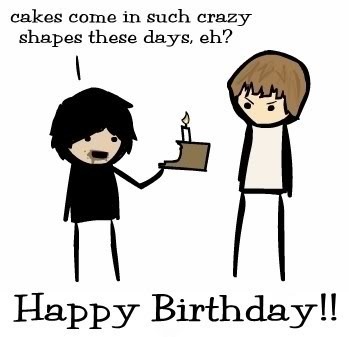
Fun fact: I turn forty on Saturday. I am ridiculously excited about it.
Really, it’s kind of silly for me to be excited at all, given that I’ve been telling people that I’m forty for the last eight years. I figured, at thirty-two, with three kids and a dog and a minivan and a house and a community garden plot, that it didn’t matter what age I told people I was. They’d hear forty no matter what I said. So I thought I’d just beat them to the punch. So one would think, given that situation, that my upcoming foray into forty would seem somewhat anticlimactic. But one would think wrong.
I am crazy-thrilled to be forty. I want to give forty a big, wet kiss. I want to take it places and buy it pretty baubles and romance its panties off. I want to take forty home and introduce her to Mother. I want to eat forty chocolates and drink forty sips of wine and run forty miles and catch forty winks and dream forty dreams.
And yet, I’ve made no plans. Because I stink at making plans. So I put it to my kids. This was our conversation:
ME: So. It’s my birthday on Saturday.
THE KIDS: It is? But we’re not ready!
ME: There’s nothing to be ready about. We’re just going to hang out.
CORDELIA: Mom. What do you want for your birthday? And don’t say socks.
ME: Socks.
CORDELIA: MOM!
(All I ever want is socks. Wool stripey socks. And I never get them.)
ME: But we should do something fun. What should we do?
LEO: I know! Skyzone!
(Do you guys know Skyzone? It’s a huge concrete bunker filled with trampolines, and Leo wants to live there. Here’s a picture:
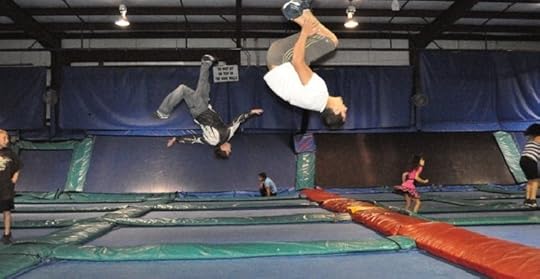
ME: We are not going to Skyzone.
LEO: Is that because you hate fun?
ELLA: We have to do something that mom likes to do.
CORDELIA: What does mom like to do?
LEO: Grocery shop?
CORDELIA: LET’S GO GROCERY SHOPPING!
ME: We are not going grocery shopping.
ELLA: Are you going to make us clean?
CORDELIA: I hate cleaning.
ELLA: It’s decided. No cleaning on birthdays.
LEO: Mom. I got it. The water park. It’s perfect.
ME: Nah.
LEO: WHY NOT?
ME: Too much man-sweat and back-tats.
LEO: I don’t even know what that means. You’re not making sense.
ELLA: You guys are terrible at this game.
CORDELIA: WE CAN GO TO THE CRAFT STORE AND YOU CAN BUY US THINGS!
LEO: That’s not as fun as a trampoline.
ELLA: Everything is more fun than a trampoline.
CORDELIA: Let’s go to the Mall of America! And shop!
LEO AND ELLA: MOM HATES THE MALL OF AMERICA AND SHOPPING.
ELLA: And probably America. Mom is a communist.
ME: I prefer “pinko”.
LEO: Mom. Just tell us.
And so I considered.
ME: I know. Let’s go to the book store. And then the sock store. How’s that?
My children shook their heads slowly, long-suffering expressions marring their beautiful faces.
ELLA: Oh, mom.
CORDELIA: Poor, poor mom.
LEO: You really stink at having a birthday.
But they are wrong. I am rocking this thing already.
Filed under: Uncategorized Tagged: Happy Birthday to Me, parenting, Skyzone, these kids are crazy, Trampoline


December 2, 2013
“The wrong boy lived.”
I participated in a reading not too long ago. And there’s video evidence!
Now, in my defense, I was just fresh out of urgent care (I developed a nasty reaction to a vaccination and was in considerable pain), so I was rushing a bit. Okay, a lot. Also there’s quite a bit of background noise. Still. Here is me, reading the first two chapters of The Witch’s Boy.
Filed under: Uncategorized


November 21, 2013
More proof that babies are brought by the stork.
In a lot of ways, I’m grateful that my kids are nothing like me. I’m the most disorganized person in the world. Messy. Distractible. I can’t draw. I can’t keep cupboards organized. I lose socks. I can’t balance checkbooks. Forms confuse me. I sometimes lose steam on projects due to crushingly low self-esteem. I didn’t do that great in school and I royally sucked at standardized tests. The things I could do well in childhood (and if we’re being honest, adulthood too) fit on an index card: tell stories, talk about stories, sing songs and make people feel wonderful about themselves. That’s pretty much it.
My kids, though. They are not like me at all. They are focused. Intense. Wicked smart. And crazily organized. So where does that come from? How does a So Not Type-A She’s Practically Type-Z And If There Was A Past-Type-Z She’d Be That mom give rise to three very Type-A kids. Even Leo – my sweet Leo! – if viewed through the lens of third-grade-boydom is pretty dang Type-A. He keeps his drawings organized and his magic cards organized and his Scouts stuff organized, and he does his homework the SECOND he gets home so he can check it off on his checklist. He’s even starting to organize his legos. (Good luck, kid.)
But of the three, it’s my middle child who is not just Type-A. She’s Type-A+. We went to her parent teacher conference the other day, and got to hear her teacher gushing about how organized she is, what a leader she is, how she comes up with creative ways to make even dry subject matter come alive. How she organizes other students into schemes to enrich the class – skits, songs, interpretive dance, all with an eye to making learning interesting and collaborative and fun.
“Yep,” I said. “Of my three kids, she’s the one who was born to run things.”
“My guess is that she’ll be my boss someday,” her teacher said. “Or maybe she already is.”
At home, she writes up schedules for the family. She makes goal statements. She starts making homemade Christmas presents in July. She is eleven for god’s sake, and she’s already written out the christmas cookie baking schedule.
We are going out East this year for Thanksgiving – something that we usually don’t do, but it was the only time to get Ted’s side of the family all together. And because it’s not the usual time that we travel, it kind of snuck up on me this year. I was eating dinner with the kids, and my oldest remarked that she has a two-day week next week.
“What?” I said. “Why?”
“Thanksgiving, mom,” my oldest said.
“Are you sure it’s November?” I said. I had honestly forgotten. All three rolled their eyes.
“Mom,” they sighed.
“Huh,” I said. “Well. I suppose you guys should pack this weekend. Then you won’t have to do it after school when you’re crazed.”
“You should pack too, Mom,” said my middle child.
“I totally will,” I assured her. But I won’t. I am physically unable to pack before T-minus-five-minutes. I make sure everyone else is packed, and I check their bags to do a socks-and-underwear-count and that there are enough sweaters. For myself, I shove stuff in a bag and hope for the best.
“Well,” my middle said. “I’m already packed.”
“Really?” I said. “We don’t leave for a week.”
“I’ve been packed for a while.”
“How long?”
“Two weeks.”
“Two weeks?”
“Maybe three.” She blushed. “I like to make sure the things I want are clean. And maybe I’ll forget what I like to have when it’s almost time to go. I also packed my activity bag. They’re under my bed. I made a list for you, Mom.”
What kind of crazy person packs in advance? My own little crazies, that’s who. They did not get this tendency from me, and they certainly didn’t get it from their dad. They arrived – a crystalline distillation of their Utter Selves, hard, bright, whole, and completely separate from me. And I love this about them, even as it makes my heart break to pieces. They are growing. Even as we sit at that table, they are light and cloud and wind. Energy. Change. Potentialities. They are growing wings. And they will fly away.
(this thing that I have. this life. it will pass away. indeed, it is passing already. and oh, my heart, and oh, my heart, my heart, my heart.)
“You think I’m weird, don’t you,” she accused.
“No, darling. You’re the most normal thing in my life. I’m the weird one. Good thing I have you.”
(What will I do without you? whispers my heart.
I have no idea, I whisper back.)
Filed under: Uncategorized Tagged: daughters, Mother, parenting, Sons, The Stork, Type-A


November 20, 2013
Restless dreamer, dreaming restlessly.

Here is what my brain looked like last night. Maybe yours too.
It is a funny thing about November, but it seems that the skin of the world begins to stretch and thin. Is it the cold, flat sky, or the muted landscape, or the fallow earth waiting for snow that makes the membrane between the waking world and the dreaming world lighten, and transparify? November is a dreaming month. And holy heck have I been dreaming
So, first of all, I realize that I have been horrifyingly delinquent in the blog department lately. I blame my kids. And their schools. And my own insufferable laziness. Because good god. Have I been lazy. There are some bits to report, though.
I managed, through my constant candle lighting and pleading to the universe, to get invited to speak at a library in Iowa. IOWA! Land of adorable towns and bucolic landscapes and wellsprings of magic bubbling underground! Land of my own dear Jack in my very first novel, and I was terribly pleased to make the visit. Here is the librarian’s take on it, and despite the low attendance, the conversation was wonderful and the audience asked fantastic questions, and that library! So very pretty.
Second of all, I have a new short story! In print and in the world! It’s called “The Insect and the Astronomer: a Love Story” and it’s available for free from Lightspeed, one of my favorite SFF magazines on these here internets. I hope you enjoy it.
Second of all, I have become a curriculum crusader, trying to change the lousy reading curriculum at my son’s school. Maybe I’m not a crusader. Maybe I’m a de-louser. Delousyer? Delousifier? Something like that. And it’s been eating up a good deal of my brain space.
Speaking of brains, I have been having CRAZY DREAMS lately, though that’s not all that unusual, given the month. I know a lot of you are writing your novels in thirty days, or are berating yourselves for not trying hard enough to write your novel in thirty days or whatever, but for me, November is a time of pinning down the zany details from my dream life. Because boy oh boy, do I dream in November. Perhaps it’s the slice of wind. Perhaps it’s the dull sky. Perhaps it’s the sleeping ground. Or perhaps it’s none of these. But in November, my dreams start speaking in tongues. They are all blazey eyes and fervent souls and minds on fire. Their voices are multitudinous, cacophonous, a festering ooze. They cover the earth in web and moss and mold. They are everywhere.
Last night I tossed and turned. I woke and woke and woke again. And when I slept, I dreamed lividly. This is what I dreamed.
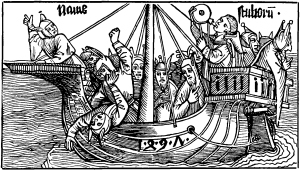 1. I dreamed that I stood on the deck of a pirate ship, at night. The scent of salt in my nose, and the stench of whatever happened below decks. I could hear the sound of men – drunk, loud, arguing. We moved at a fair clip, and the pulse of the the waves underneath - thwump, thwump, thwump - was a soft, damp, soothing sound. I stood at the stern, looking at the white and yellow churn of the wake, the tangle of fish and sharks waiting to snatch whatever fell overboard – the waste, the wasted, the sick, the dead, and the unfortunate souls still trying to kick their way back to the living. I sat on the rail. I had a lead box on my lap – acid etched with the image of a spiral covering the lid. I sighed, pressed my fingers into my sternum, and opened up my ribcage with a rusty creak. I reached in, and removed my heart. It was made of sticks and grass and dried petals. There were feathers at its center. It was a good heart, in theory, but it had become unmanageable. I sealed it inside the box, and let it fall with a plop into the waves. I tipped back my head and regarded the stars. How long, I wondered, before my heart made it back to me? How long indeed?
1. I dreamed that I stood on the deck of a pirate ship, at night. The scent of salt in my nose, and the stench of whatever happened below decks. I could hear the sound of men – drunk, loud, arguing. We moved at a fair clip, and the pulse of the the waves underneath - thwump, thwump, thwump - was a soft, damp, soothing sound. I stood at the stern, looking at the white and yellow churn of the wake, the tangle of fish and sharks waiting to snatch whatever fell overboard – the waste, the wasted, the sick, the dead, and the unfortunate souls still trying to kick their way back to the living. I sat on the rail. I had a lead box on my lap – acid etched with the image of a spiral covering the lid. I sighed, pressed my fingers into my sternum, and opened up my ribcage with a rusty creak. I reached in, and removed my heart. It was made of sticks and grass and dried petals. There were feathers at its center. It was a good heart, in theory, but it had become unmanageable. I sealed it inside the box, and let it fall with a plop into the waves. I tipped back my head and regarded the stars. How long, I wondered, before my heart made it back to me? How long indeed?
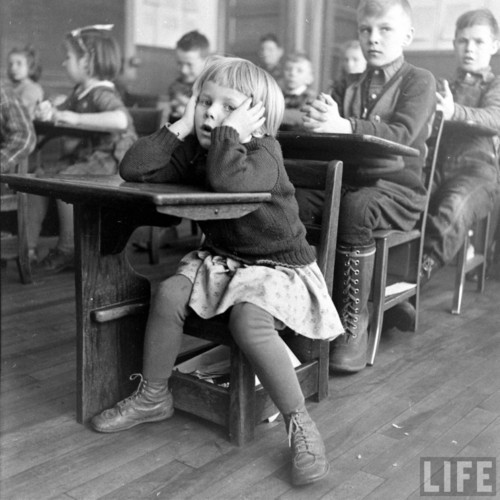
This is pretty much what I looked like every day at school.
2. I am in third grade. I have finished my math worksheet. The teacher’s desk is so far away. I am in the back row and I see row after row of perfectly combed heads, and from this side they are benign, but on the other side they have eyes. And so I do not turn in my worksheet. The room smells of wood shavings and moon boots. The paper is crisp in my hand. The smell of graphite. The smell of erasers. The touch of paper crumpling under my sweaty fingers. When it is mashed into a tiny ball, I shove it into the tight space at the back of the desk, with everything else I’ve done all year. I haven’t turned a single thing in. I can’t explain why. I stare at the brown ponytail in front of me and think of nothing.
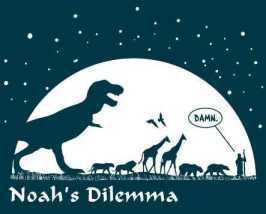
3. I am in my grandparents’ back yard. It was big in real life, but now it is enormous. It is a nation of grass. There is a velociraptor about thirty feet away from me, trying to catch squirrels in the large apple tree. And I think, maybe there has always been a velociraptor in my grandparents’ back yard. Maybe my grandfather raised him from a chick and named him Arnold. Maybe I used to ride on its back when I was a little child, and it would tickle my belly with its enormous jaws. Maybe I was wrong to think of a life that didn’t have a velociraptor in it, and maybe memory is a tricky thing, liable to blur the things that are important and hide us from ourselves so we remain forever lost. And while I am thinking this, the velociraptor, tiring of squirrels, bounds to my side, all muscle and joy and movement, and throws me in the air, and rips out my throat and I am gone.
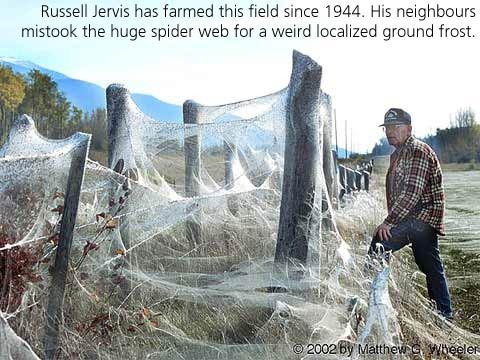
4. There are spiders everywhere. They line the walls, the crunch under my feet. They are in my bed, in my clothes, in my drawers, in my shoes. They are in the food. They are on the windows and the sidewalk. They fill the car. They hang from the trees. There are spiders, spiders, spiders and they are everywhere. They have wings. They burrow. They crowd out the light. They infect the eye, the ear, the nose, the mouth. I have this dream a lot. It is always horrifying.
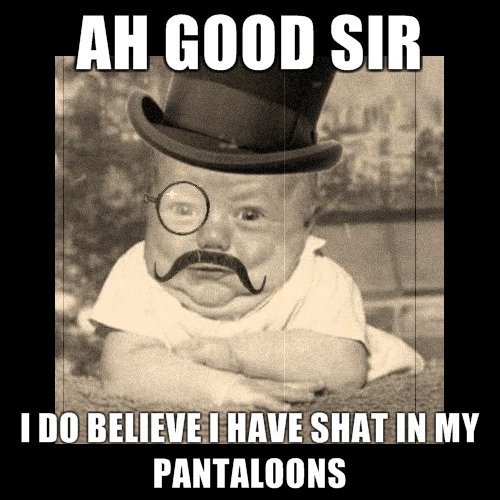
5. I had no idea I was pregnant. A baby pops out, after a sneeze. A boy. He has a mustache and bifocals and insists on being named Wally, and he clicks his tongue when a pretty girl walks by. He is eight pounds and will only drink bourbon and complains about the no smoking policy in my house. I burp him but his breath stinks and he asks if he can watch the booby shows on the television and why are there so many kids on his lawn. He shaves. His diapers reek. I never asked for this child. I feel incredibly guilty for thinking such a thing.
6. I am driving a race car. I have never driven a race car. There are cars in front of me and cars behind me and I cannot stop and I cannot turn around because everyone is going like nine million miles an hour and it is loud and I am sweating in this jumpsuit and I smell bad and I have no idea what I am doing, but all I can do is floor it and hope for the best.
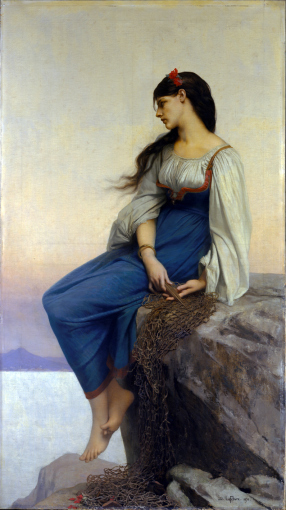
7. I am standing at the edge of the sea. My daughters are in a row boat, and they are rowing away. They are so very far away now. The water is cold, but I stand in it up to my knees. I strain my eyes to see them. I shade my brow. Their hair glints in the sun. Their muscles strain. They reach and pull across the fulcrum of their hips. They are so strong. They are so small. The sea goes and goes – a universe of water. It swells and dips and pays them no mind. It guards its own secrets. It does not bend to those who bent my life into a new shape. The sky goes dark. The sea goes quiet. And they are gone.
So. Thank you, November. I’m exhausted, of course. But thank you.
What have you been dreaming lately?
Filed under: Uncategorized Tagged: Dream Sharing, Lightspeed, Space Cadet


September 27, 2013
We are braced for boys.
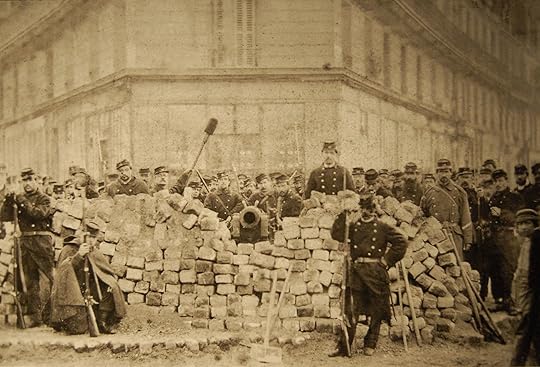
There will be boys. Fifteen of them. No, sixteen. They will descend tomorrow as the rain pours and pours and pours outside. It will be raining boys.
My original plan, as these eight and nine year old hoodlums celebrate my son’s transition from eight to nine, was to have them outside the entire time. Capture the flag. Pin the nose on the zombie. Running races. What have you. Now, instead, we will be doing a scavenger hunt in the rain, and maybe tag, and then there will be different stations indoors. Legos in the basement. Learn-t0-play-poker-with-buttons in the dining room. Risk in the living room. Duct tape creation station in the attic.
Pray for me, my friends. Pray that barricades hold the huns at bay. Pray for keen minds and sharp wits and cat-like reflexes. And pray that the weatherman is wrong and we really can be outside, because good god. I don’t know if my house is engineered to withstand that kind of level of Crazy.
(And oh! My baby boy! How can he be turning nine? In only a few days. Nine!)
Filed under: Uncategorized



